Qatar forfeit basketball game in hijab row
Updated: 2014-09-25 09:50
(Agencies)
|
||||||||
|
Qatar's women's basketball team leaves the court after forfeiting their women's basketball game against Mongolia at Hwaseong Sports Complex during the 17th Asian Games in Incheon September 24, 2014. The Qatar women's basketball team forfeited a game at the Asian Games on Wednesday after being refused permission to wear the hijab, saying they were taking a stand against what they say is a discriminatory policy against Muslim women. [Photo/Agencies] |
INCHEON, South Korea - The Qatar women's basketball team forfeited a match at the Asian Games on Wednesday after being refused permission to wear the Islamic headscarf, taking a stand against what they say is a discriminatory policy against Muslim women.
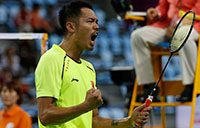 |
| South Korea beats China to win badminton men's team title |
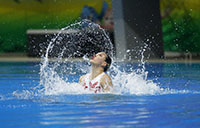 |
| China wins gold in synchronized swimming duets |
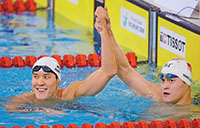 |
| A rivalry based on respect |
However, the players refused, saying it violated their religious beliefs and they wanted to send a strong message to the sport's governing federation that the ban was unfair.
"We have to take this stand," said Ahlam Salem M. Al-Mana of Qatar. "We are here to push the international association that all Muslim teams are ready to compete in any competition.
"We knew about the hijab ban, but we have to be here. We have to show everyone that we are ready to play, but the International Association is not ready."
A spokesperson for the Incheon Asian Games (IAGOC) said that organizers had no alternative other than to declare a forfeit because, "the rule that the players broke is International Basketball Federation rule 4.4.2, which talks about uniforms and what players can wear.
"The technical official asked them to remove the scarf and they refused, so the game was forfeited by Qatar."
An assistant with Qatar's National Olympic Committee who declined to be named said they had not made up their minds about whether they would play against Nepal on Thursday.
Qatar are also scheduled to play Kazakhstan on Friday and Hong Kong the following day.
The Olympic Council of Asia (OCA) said in a statement that it was the duty of sports governing bodies to protect the rights of competing athletes.
"The right of the athletes must be the highest priority," said OCA Director General Husain Al-Musallam.
The director general added that FIBA had had years to resolve the issue with its Asian body and that sports federations had a duty to let athletes "exercise their right of freedom of choice with dignity."
'TESTING PHASE'
The use of hijabs has become a hot topic in sport in recent years with Muslim athletes complaining that they are being discriminated against.
Human rights groups and the United Nations joined forces to put pressure on sporting bodies to lift the bans.
Earlier this year, the International Football Association Board (IFAB) unanimously overturned a ban on the garments, allowing soccer players to wear them.
They had previously been banned due to safety concerns and because they were not recognized in the laws of the game. But FIFA medical reports showed there were no safety concerns.
Other sports at the Asian Games allow athletes to wear the hijab. All four members of the Iranian lightweight women's quadruple sculls team wore hijabs as they rowed to a bronze medal on Wednesday.
Basketball remains one of the exceptions, though FIBA said earlier this month it had held discussions on the issue and was introducing a two-year 'testing phase' on what players can wear.
"Relaxing the current rules regarding headgear in order to enable national federations to request, as of now, exceptions to be applied at the national level within their territory without incurring any sanctions for violation of FIBA's Official Basketball Rules," FIBA explained.
"National Federations wishing to apply for such an exception to the uniform regulations shall submit a detailed request to FIBA. Once approved, they shall submit follow-up reports twice a year to monitor the use of such exceptions."
The Incheon official said there had been no instructions from FIBA regarding the hijab.
"FIBA informed me they had not released a statement regarding possible changes yet," the official added.
Qatar's Amal Mohamed A Mohamed said she was confused as to why they were not allowed to wear the hijab at the Asian Games, which are being run under the slogan: 'Diversity Shines Here'.
"I just don't understand why we're not allowed to play with the hijab. I don't think the hijab is dangerous, and negatively influences the match or other players," she said.
"We've attended many international competitions in Indonesia and China. Therefore, we will not attend any games in this Asian Games unless the officials change their decision."
- Highlights of Asian Games on Sept 23
- South Korea beats China to win Asian Games badminton men's team title
- Sun Yang wins men's 400 free in Asian Games
- Australia 'interested' in joining Asian Games
- Highlights of Asian Games on Sept 22
- Highlights of Asian Games on Spet 21
- China trio win 1st gold at Incheon Asian Games
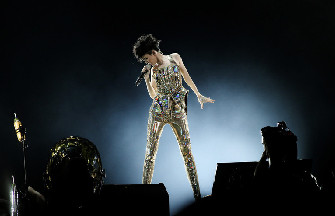
 Star Stefanie Sun holds concert in Beijing
Star Stefanie Sun holds concert in Beijing
 Faye Wong's manager refutes star's drug rumors
Faye Wong's manager refutes star's drug rumors
 Lu Yi and daughter Bei Er pose for street snaps
Lu Yi and daughter Bei Er pose for street snaps
 Photoshoots of actress Li Xiaomeng
Photoshoots of actress Li Xiaomeng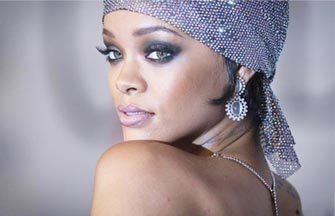
 Council of Fashion Designers of America Awards
Council of Fashion Designers of America Awards
 Fan Bingbing, first Chinese actress in Barbie Hall of Fame
Fan Bingbing, first Chinese actress in Barbie Hall of Fame
 Awarding ceremony of 2014 hito Pop Music held in Taipei
Awarding ceremony of 2014 hito Pop Music held in Taipei
 Zhao Liying's photo shoot for Children's Day
Zhao Liying's photo shoot for Children's Day
Most Viewed
Editor's Picks

|

|

|

|

|

|
Today's Top News
Obama urges further coalition efforts against IS
China boosts climate efforts
Central Asian nations are ready to roll on the 'new Silk Road'
Ex-Chinese planning official confesses to graft
Alibaba's shares down for second day
Emissions report tells only part of story, expert says
Xi reassures HK on stability issue
Obama, Zhang meet at UN
US Weekly

|

|







